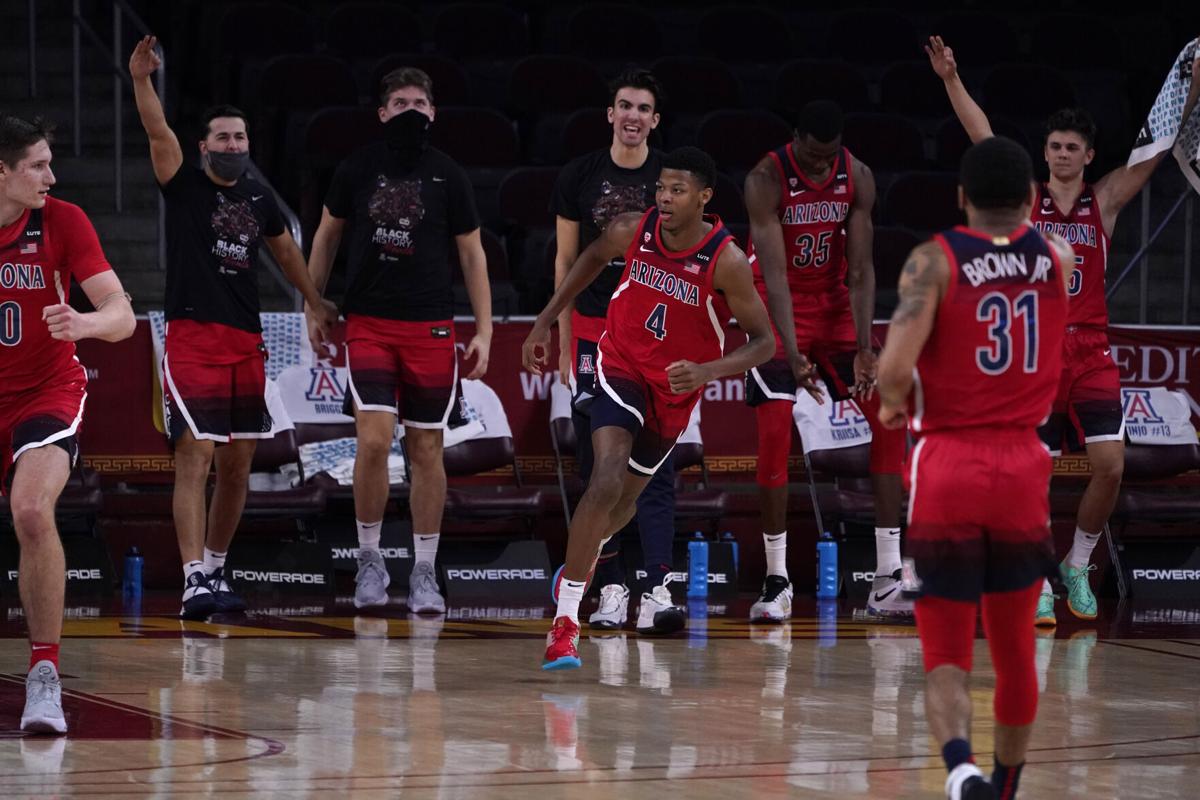Throughout the bumpy last season and a half of college basketball, the Arizona Wildcats haven’t paused once because of their own COVID-19 issues.
Except now they might feel like they are. No symptoms, no positive tests … but also no games.
The Pac-12 on Thursday did not reschedule No. 8 Arizona’s postponed game at USC for Saturday as the Wildcats had hoped, meaning UA faces another long layoff before Thursday’s game with Colorado unless it succeeds in a last-ditch effort to schedule a nonconference game this weekend.
Already having played just one game since Dec. 22 because of pauses at UCLA and USC over New Year’s weekend, the Wildcats earlier had lined up a game with Colorado State on Saturday at McKale Center before the Mountain West Conference instead ordered the Rams to play at San Diego State, which lost a game with Nevada because of the Wolf Pack’s COVID-19 issues.
The Wildcats then expressed interest in playing USC, which lost a game at Stanford on Saturday because of the Cardinal’s continued COVID-19 pause.
Theoretically, Arizona also had time to make up its game at UCLA on Thursday, but that date did not appear to be in anybody’s best interest. UA coaches left town to recruit on Tuesday, while UCLA was just coming back from its COVID-19 pause and, in a temporary new ruling, also unable to host fans.
The Pac-12 has declined repeatedly to comment on rescheduling specifics with Arizona, issuing a statement to the Star on Wednesday saying it has the final say in rescheduling but does so after consulting with schools and television partners.
Further complicating UA’s games in Los Angeles are the temporary orders barring fans from indoor events at USC and UCLA, meaning those schools would have to face the Wildcats without crowd support and the extra gate revenue Arizona would generate.
The conference also said it makes rescheduling decisions while being “mindful of student-athlete health and safety.” Playing only one game over the first two full weeks of conference play means the Wildcats will either face a hectic schedule the rest of the way — or not play a full 20-game league schedule.
Arizona has had four conference games postponed so far and has made up one of them, a 95-79 home win over Washington on Monday that was a make-up for a game initially scheduled for Dec. 2. The Wildcats lost a Dec. 30 game at UCLA, a Jan. 2 game at USC and a Saturday date at ASU because of their opponents’ COVID pauses.
Last season, the Wildcats had eight games canceled or postponed because of opponents’ issues but managed to play a full 20-game conference schedule and six of seven possible nonconference games. They had to travel to Oregon twice, the last time on Monday, March 1, to make up a game with the Ducks that turned out to be their season finale.
If the Wildcats were to add a nonconference game this weekend, they would have to secure a “legislative relief waiver” from the NCAA because doing so would mean they would exceed the scheduling maximum if they also still wind up playing a full 20-game conference schedule.
Meanwhile, the NCAA selection committee issued a statement Thursday that nudged schools and conferences to play make-up games whenever safely possible.
The NCAA’s statement said the men’s and women’s selection committees would consider the unavailability of players and coaches due to COVID-19 as it does with injuries and other illnesses. It didn’t specifically say it would also note if a game was played with one team coming directly off a COVID pause but did say it would “continue to monitor the impact of scheduling disruptions.”
However, it is unclear whether the selection committee would factor in anything for a home team playing without fans, as USC and UCLA would have had to if they hosted Arizona this weekend.
A joint statement from NCAA men’s basketball committee chair Tom Burnett (the Southland Conference commissioner) and women’s basketball committee chair Nina King (Duke’s AD) said the committees would track personnel availability through its conference monitoring program. Typically, each committee member is assigned several conferences in which to keep track of issues beyond scores.
“Losses are still losses, and wins are still wins, but we will continue taking into consideration the absence of a coach or players, whether they are COVID-related or due to injury or suspension,” the NCAA’s statement said. “We therefore encourage teams to honor conference-developed scheduling and rescheduling policies when the appropriate number of safe and healthy players and coaches are available to compete.”
The NCAA also updated its COVID-19 guidance, which paralleled what the Pac-12 issued last week.
In the NCAA’s guidance, vaccinated players must quarantine for five days if they test positive and can return without a mask after that time if they have no symptoms and test negative. Vaccinated players also do not have to quarantine following exposure if they are not symptomatic.





